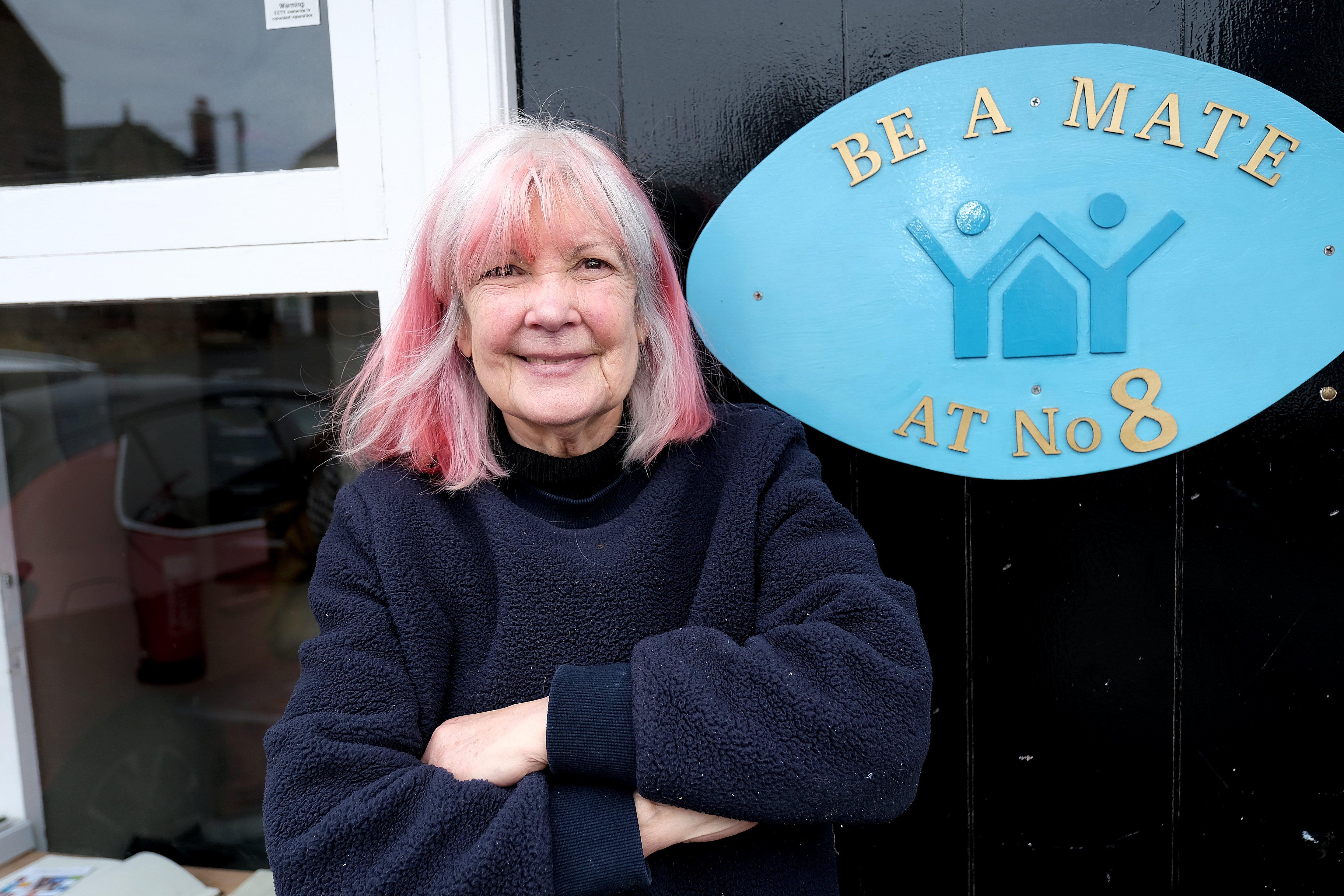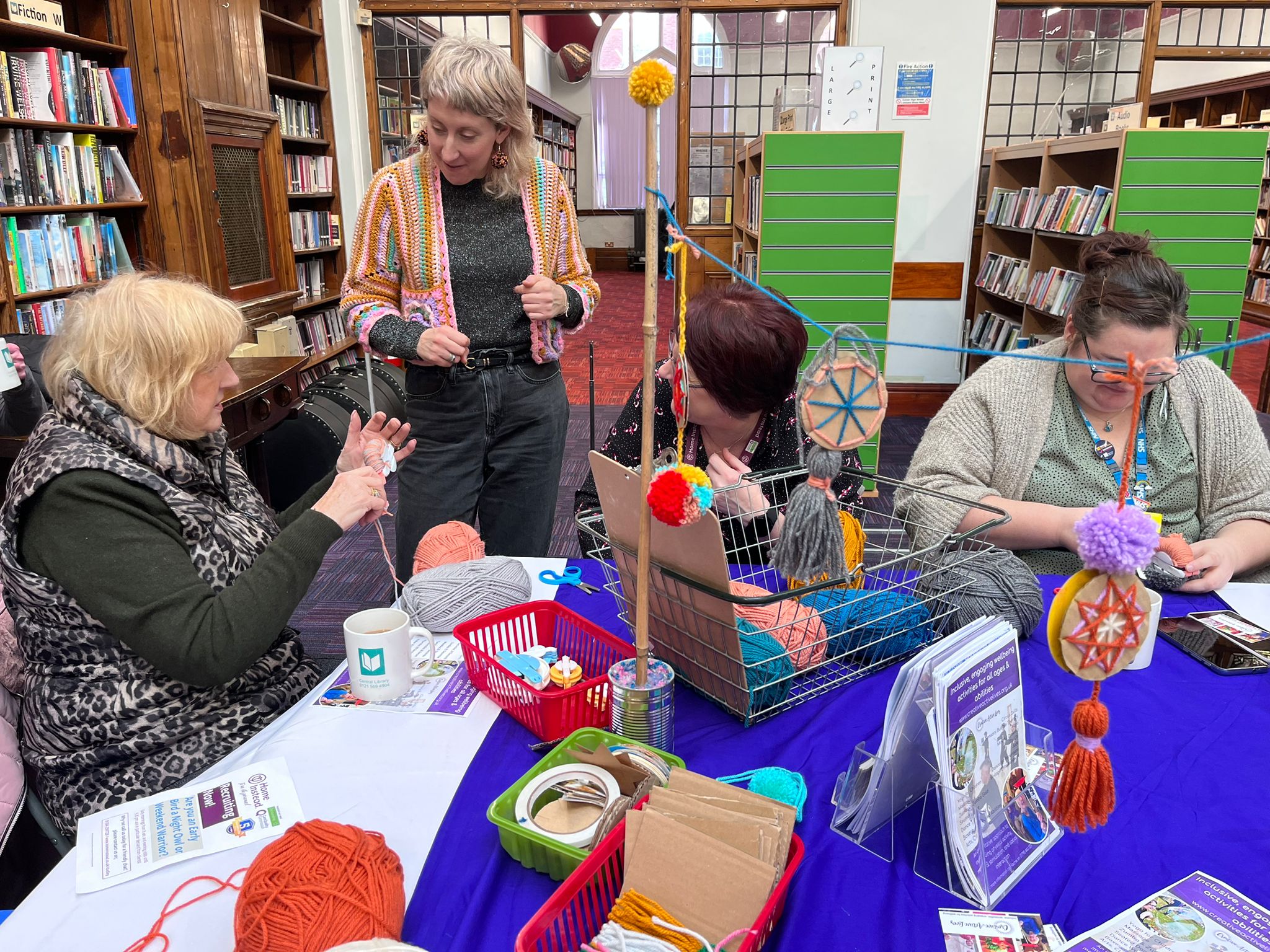
Looking after our mental health and wellbeing is not something we should just do when feeling low, overwhelmed or anxious; it’s something we should proactively maintain, just like our physical health.
Staying on top of it helps us cope with the normal stresses of life and deal better with challenges we may face in the future. And over time, it can reduce our risk of physical health problems, too.
There are lots of small things we can do to look after our mental health and wellbeing, and they can make a big difference to how we feel. One way of doing this is to connect with others.
Scarborough Mates is a community charity that runs a friendly group of men and women who meet up to try out new activities, exchange ideas and chat over a cup of tea.
“We are trying to tackle isolation,” explains Charles Airlie, trustee, retired industrial chemist.
“We have a workshop for woodwork and metal work, a ceramics room complete with a kiln. There is also a model railway room, a craft room and we have our own kitchen.”
Patti Chico, 76, retired midwife and trainer, brought her husband Tony, a retired doctor, to the group after he suffered a stroke five years ago.
“I joined myself and I am like a child in a sweetshop, always doing something new. I am learning woodwork so I can make money boxes for my grandchildren,” she says.
"The camaraderie is wonderful. I cannot praise the place enough, it has such a lovely atmosphere.”

Spending quality time with friends or family, talking to someone about how you are feeling or finding ways to help other people can all help stop you from feeling lonely and improve your mental health and wellbeing. This can be online, over the phone or seeing someone in person.
Another means of addressing poor mental heath is to reframe unhelpful thoughts.
The way we think, feel and behave are linked, and sometimes we develop patterns of thought that are unhelpful, so recognising them, trying to think about them differently and replace them with alternatives can improve your mental wellbeing.
Moving your body also helps.
Being active is not just good for your physical health, it’s good for your mind too. It can help you burn off nervous energy, and, while it will not make feelings of distress disappear completely, it can make them less intense.
Try activity that is right for your physical abilities. You might choose a short walk in the fresh air, gentle yoga or set yourself a challenge.
The NHS Active 10 app can help you track and build up your daily walks or the NHS Couch to 5k app can help many gradually work towards running 5km in just 9 weeks.
Also, binning bad habits like smoking and cutting down on alcohol can have a positive effect on our mood. There is a range of NHS apps to help - visit nhs.uk/better-health for more help.
Releasing muscle tension can help ease your anxiety and you can do it anywhere, so it’s a good way to ground yourself if you’re feeling overwhelmed. All you need to do is take 30 seconds to repeatedly squeeze, hold, and release your fists, breathing slowly in and out.
Good-quality sleep makes a big difference to how we feel mentally and physically. When you are struggling to sleep your mind can flood with thoughts and worries about the next day, which makes it even harder to unwind. Instead, get out of bed and do something simple - like writing a to do list or reading a book - until you feel tired again.

Rachel Conlisk runs the friendship café, offering activities such as steel drumming, coding and crafting, at West Bromwich Central Library.
The 47-year-old believes finding kindred spirits helps improve people’s mental wellbeing.
“I was anxious and depressed, but hula-hooping gave me confidence and brought me into a circle of people I felt comfortable talking to,” she explains. “That helped me feel less isolated, so I wanted to start a company that gives people the opportunity to find out what works for them.”
Resources available online to help you look after your mental health and wellbeing
Better Health-Every Mind Matters
- Better Health-Every Mind Matters is an NHS-approved website full of free resources to help you look after your mental wellbeing and support that of others. It helps you tackle the four most common mental health concerns: anxiety, low mood, stress and trouble sleeping. It also helps you maintain good mental wellbeing.
Available via the Every Mind Matters website is:
- A free personalised Mind Plan - a mental health action plan that provides practical tips to help you deal with anxiety and stress, boost your mood, sleep better, and feel more in control. UK based Amazon Alexa users can just say, ‘Alexa, start my Mind Plan’ for help today.
- Self-help CBT (cognitive behavioural therapy) techniques to help you deal with worries and unhelpful thoughts, work through problems in new ways, build resilience and boost your mental wellbeing.
- An email programme with expert advice and practical tips to help you deal with anxiety. It will also show you how to make these new steps part of your daily routine to ease your anxiety.
- Search ‘Every Mind Matters’ today
NHS Talking Therapies
- The psychological therapies offered by NHS Talking Therapies (the new name for IAPT) are practical and can help with a range of common mental health disorders including depression, anxiety, phobias, panic attacks, obsessive-compulsive disorder, body dysmorphia and post-traumatic stress disorder.
- They can also help you cope with anxiety or depression in the context of long-term physical health conditions like diabetes or cancer.
- NHS talking therapies are free, effective and confidential treatments delivered by fully trained and accredited NHS practitioners. They can be accessed online or in person.
- Refer yourself today: to be eligible you just need to be registered with a GP (General Practitioner). Go to nhs.uk/talk to find your local NHS Talking Therapies service and fill in an online form, or email or phone the service.
NHS App
Owned and run by the NHS, the free NHS App is a simple and secure way to access a range of NHS services. It is available to anyone aged 13 and over who is registered with an NHS GP practice in England and the Isle of Man.
Get the NHS App to:
- Order repeat prescriptions
- View your health information securely
- Get health advice using the health A-Z on the NHS website
- Find NHS services near you
- As well as accessing mental health services
- For more information visit nhs.uk/nhs-app. Download from the App Store or Google Play.
Hub of Hope
- No matter what you are going through, you should not have to face it alone. Hub of Hope, run by the charity Chasing the Stigma, enables you to find out what’s available locally and nationally to help you tackle a range of mental health concerns and disorders, including anxiety, depression, trauma or PTSD and their causes, such as financial concerns, loneliness, gambling or substance misuse.
- Visit www.hubofhope.co.uk or download the free app via the App Store or Google Play and simply type in your postcode to get started
Samaritans Self-Help
- Samaritans Self-Help is there to support you, no matter how you are feeling. You can explore relaxation techniques, record your mood every day, look for patterns in how you’re feeling, make a personal safety plan and store images of things that give you hope. Search Samaritans Self-Help.
Shout
The Shout website includes resources and tips to support you when you’re feeling anxious, low, stressed or overwhelmed. Visit giveusashout.org
If improving your mental health and wellbeing sounds daunting, starting small can help.
Make a plan for managing upcoming stressful days or events – a to-do list, travel timetable or note of things you need to take can really help. If a task seems overwhelming and difficult to start, try breaking it down into more manageable chunks and give yourself credit for completing them.
Try keeping a diary of what you are doing and how you feel at different times to help identify what's making you anxious and what you need to do to help manage it. You can also write down some of the challenging situations you have overcome in the past as a reminder of what you’re capable of. Keep this to hand and be your own cheerleader!
As much as we love them, our devices can give us lots of things to worry about. Take a moment to look up from your phone and notice the world around you. Have a screen break and read a book, listen to a podcast or go out and enjoy the outdoors. For better sleep, plan an hour of screen-free time before bed.
Equally important is taking time to appreciate the present moment and not thinking about the future or the past. This can be helpful as you have some control over the present, but you have no ability to change things that have already happened and have less control than you might think over future events. This is sometimes known as being mindful.
Whether it’s enjoying your favourite hobby, learning something new or simply taking time to relax, it is important to do things that make you happy. Do not feel guilty about this; it’s good for your mental health.
Help in a crisis
- If you are having thoughts of suicide, are harming yourself or have thought about self-harm it is important to tell someone.
- These thoughts and feelings can be complex, frightening and confusing but you do not have to struggle alone.
- If you cannot wait to see a doctor and feel unable to cope or keep yourself safe, or you just need somebody to talk to, contact one of the organisations below to get support right away:
NHS urgent support
- Find your local 24/7 NHS crisis line on nhs.uk/urgentmentalhealth or visit 111.nhs.uk
- If you do not feel you can keep yourself or someone else safe, call 999.
Papyrus
- If you are under 35 and experiencing thoughts of suicide, or for anyone that is concerned that a young person could be thinking about suicide, Papyrus’s website, text, email and telephone services are available 9am – midnight, 7 days a week, 365 days a year:
- Visit papyrus-uk.org
- Call 0800 068 4141
- Text 07860039967
- Email pat@papyrus-uk.org
- WebChat service is available from 3pm to 6pm weekdays.







